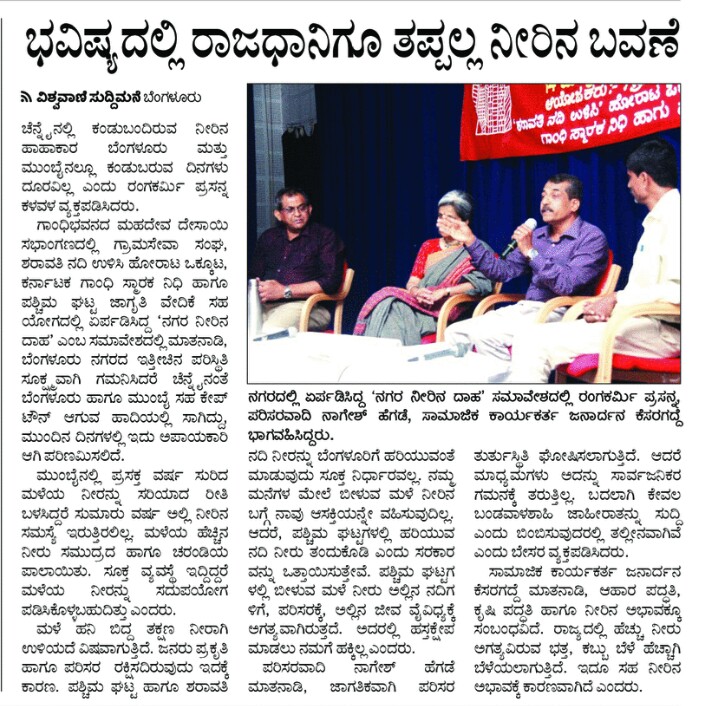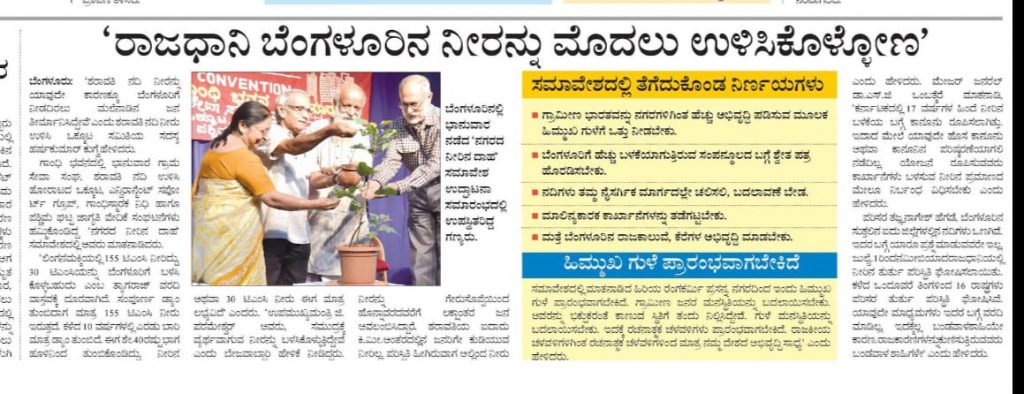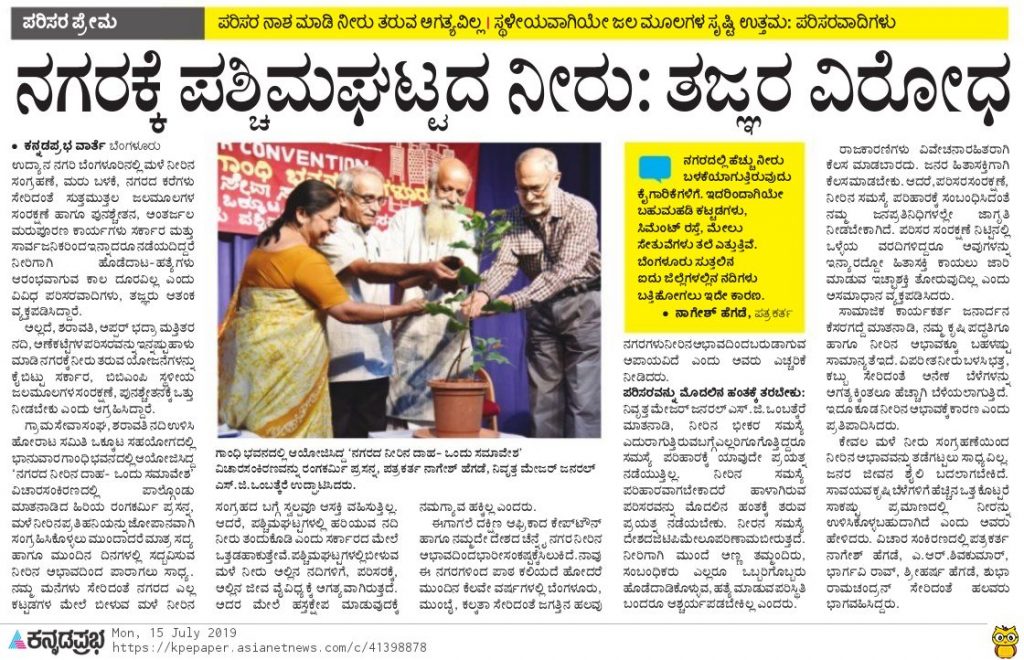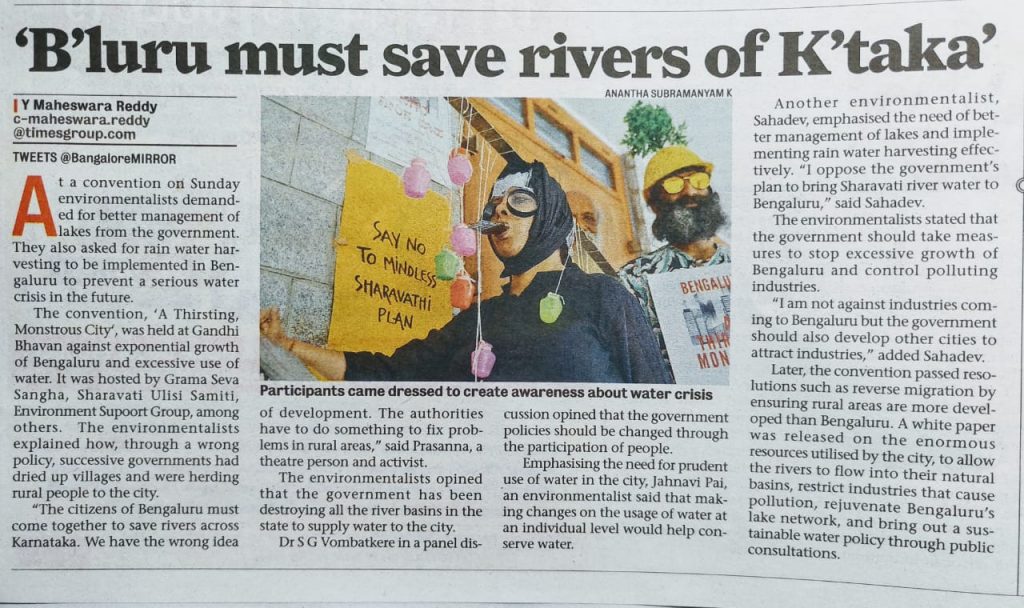Report on ‘A Thirsting, Monstrous City’, a seminar of environmentalists against excessive growth and water use in Bengaluru
A report by Abhijna Bellur, Sana Huque and Sahana Subramanian.
A convention on “A Thirsting, Monstrous City” was organized on 14th July 2019 by Gram Seva Sangh, Sharavathi Nadi Ulisi Okkuta, Environment Support Group, Karnataka Gandhi Smaraka Nidhi and Paschima Ghatta Jaagruti Vedike. The convention raised several important questions about the unsustainable growth of Bengaluru, its development at the cost of other regions in the state and also discussed ways to ensure water security in the city. These questions, along with other important topics were discussed by panelists who suggested ways to manage the city’s water resources more efficiently. The convention was inaugurated by renowned journalist Shri. Nagesh Hegde , Dr Maj. Gen S.G Vombatkere (Retd.), noted thespian Shri Prasanna Heggodu, Secretary of Gandhi Bhavan and Smt. Indira Krishnappa with the watering a Pipal tree sapling.
At the convention, environmentalists and activists tabled and passed six important resolutions. They are:
- Reverse migration by ensuring rural areas are more developed than Bangalore
- A white paper on the enormous resources utilised by Bangalore
- Rivers should be allowed to flow in their natural basins
- Restrict polluting industries
- Rejuvenate Bangalore’s lake networks
- Bring out a sustainable water policy through wide public consultations with all sections of society
The convention was presided by Smt. Indira Krishnappa, the Honorary Secretary of the Karnataka Gandhi Smaraka Nidhi. The convention began at 11 AM with a musical performance by the Bhoomi Thayi Balaga and a concept art performance which depicted the extensive demand of water by the ever growing city of Bengaluru. The welcome by Shri. Prasanna raised concerns about the lack of attention to the ever-expanding Bangalore and the attack on the confidence of the rural population to live without dependence on the city. As a result, he bemoaned, the rural youth were abandoning villages and rushing to cities, making live in rural and urban areas unsustainable and unlivable. He asserted that the city does not have enough water to keep up with this monstrous growth. Prasanna urged Bangaloreans to build a sense of camaraderie with the rural folk, learn from rural Karnataka, and work towards rural development by ensuring reverse migration becomes a reality for the benefit of rural and urban populations of the state.
The first panel (figure 3) was moderated by Leo F. Saldanha of Environment Support Group (ESG). This panel discussed “The MonstrousCITY of Bangalore”. Bhargavi, ESG Trustee, argued that the city’s growing infrastructure demands were artificially promoted to incentivise profit for financiers, and this, in turn, caused unsustainable expansion of the city. The ecological and social footprint of this form of development was widespread, and resulting in extensive consumption of natural resources. Meanwhile, there was no emphasis on reviving rural livelihoods, and funding priorities were skewed towards incentivising financially lucrative ‘scalable’ models, while causing ecological and social disruptions. In fact, in the name of developing ‘sustainable’ energy, massive tracts of productive farmlands and commons were being diverted to utility scale solar parks, by marginalising thousands of farming families A. R Shivakumar, a senior scientist and water conservation expert, called for efficient management of local resources through large scale rainwater harvesting, which, he explained, are so simple anyone and everyone could adopt them. Yet, very few have as there is no pressure from either the state or regulatory agencies to insist on rainwater harvesting as the first step of capturing and using good clear water. He argued that the greatest freedom, of access to good, clean water was within everyone’s reach, and yet there was acute dependency on tapping faraway rivers and expecting piped water to be delivered to every doorstep, which was clearly unnecessary, unaffordable and ecologically destructive. Janardhan Kesargadde called for people to adopt a change in their lifestyle ways of living that were compassionate and did not hurt others’ choices. This demanded responsibility to live without extracting resources that others needed for their survival. When working with communities in reviving Arkavathy, a common question was if it was to serve Bangalore’s water demands. To which, he said he would reply, is to sustain the needs of those who live along Arkavathy. If this concept is internalised in development, he argued, there would not be the water crisis prevailing today, and cities would not have grown beyond their natural carrying capacities. And this concern is not limited to urbanisation, Janardhan said. Farming communities need to take responsibility of the wasteful consumption of water that is so widespread with the unnecessary cultivation of water intensive crops (paddy and sugar, in particular), when nutritious food could easily be grown with least water consumption.
The second panel (figure 4) was moderated by C Yatiraju of Tumkuru Science Centre and the School of Natural Farming. He set the tone for the panel to address “A thirsting city and our dying rivers”. Maj. Gen. S. G Vombatkere (Retd.) a Retd Major General explained how the prevailing economic system which was based on extraction and accumulation of wealth, which process government reforms aggressively supported, is core to the prevailing condition of unsustainable cities. Economic growth policies result in ecological damage, he argued. And this demanded a conscientious effort on the part of the informed population to question and challenge the momentum building for such a destructive paradigm of development, and thus contain the damage and reverse the process. A fundamental reform of agricultural policy is essential to ensure rivers aren’t destroyed to sustain farms, he said.
K.N Somashekar, an environmental activist said that diverting water from the Sharavati will have negative consequences on the farmers of the area. He expressed concern that existing dams are already heavily silted and there is not enough water for the farmers downstream, leave alone to supply the water to Bangalore. Shubha Ramachandran, who leads the water team lead at Biome Environmental Trust, wondered if Bangalore is only a reluctant monster. In her assessment, residents of Bengaluru are willing to work towards building water security. This, she said, she had observed in her work with various communities, when promoting rainwater harvesting and other measures to build water security. Notwithstanding this positive momentum, she emphasised the importance of groundwater recharge, as saturated groundwater aquifers contributed substantially to river flows and thereby maintain riverine ecologies.
Shri Harsha Hegde, an activist working for conservation of the Western Ghats, highlighted the plight of the people of Malnad due to various governments undertaking a series of development projects, such as the Linganamakki Dam. Despite all the water electricity generated here, the local villagers homes continue to be dark even now. He said that people of Malnad are being pushed to their limits, and the Sharavathi diversion will anger them. He called for the blanket ban against any destructive development in the western ghats.
The third panel (figure 5) was moderated by Sanketh Kumar who is an Environmental Activist and an engineer. The panel discussed the “Shape of tomorrow’s Bengaluru”. Sahadev, from the Paschima Ghatta Jagriti Vedike, spoke on the impact of Bangalore’s growth on the Western Ghats. For instance the Kaiga power plant in Karwar involved the felling of about 2 lakh trees in the Western Ghats, and the power was all exported to Bangalore 500 kms. away. Local people were forced to sacrifice on the assurance they would benefit. But two decades later, these promises have not been kept. This is typical experience of any project affected community and Sahadev felt children and youth of Bengaluru must be sensitised to such sacrifices made by the other regions to ensure Bangalore’s success.
Harsha Kumar Kugwe, a journalist and an activist at Sharavati Ulisi Horata Okkuta, asserted that people of Malnad are determined to not support Bangalore’s demand of Sharavati’s water. He suggested that Bangalore must have an efficient wastewater system to reuse water. Anand Malligavad, a lake rejuvenation activist, suggested saving of Bangalore’s water through ecological revival of lakes and tanks across the city. This can be done through long term solutions, such strong lake protection policies, and also through short term measures, such as fund allocations for lake rejuvenation.
Jahnavi Pai, an environmentalist, suggested that conscientious changes are required at an individual level, and there must be a deliberate effort to walk away from consumerism. Life is better for all when local resources are sourced for food, clothing, buildings, etc. Besides, buying handmade products sustains more livelihoods causing least impact on the environment, as opposed to industrial products that have massive environmental and socio-economic consequences. Sourcing locally made products and eating locally grown produce is the way forward and is truly a futuristic way to build sustainable living and cities, Jahnavi argued. For all this to succeed, collective action must follow individual transformations, she said.
Some of the key takeaways from the panel discussion included:
- The diversion of Sharavati to quench Bangalore’s thirst is not sustainable
- The idea of development must not only be limited to economic development.
- Citizens must engage critically in issues like water security and there must be collective action in bringing about change.
- Large scale rainwater harvesting measures have to be undertaken to ensure water security of Bangalore.
- Lakes and tanks across Bangalore must be ecologically revived
- Waste water should be treated and reused.
- Changes have to be brought at the individual, community and government levels to address water crisis.
Following these panel discussions, veteran journalist and science writer Nagesh Hegde, presenting summarising remarks bemoaned that citizens are not yet alert enough and aware of the serious threats due to climate change. Media is preoccupied with advertisements and latest controversies and simply is not focussing on climate emergencies that already have started affecting us. He stressed on the importance of leading a minimal and simpler life, and the importance of focussing on larger concerns by engaging with public decision makers systematically and substantially.
Indira Krishnappa, in her concluding presidential remarks, emphasized the need for us to move out of our comfort zone and treat the water crisis as an emergency. She called for constructive action against climate change.
The convention concluded with Vinay Sreenivasa of Alternative Law Forum confirming unanimous adoption of resolutions proposed.
The following are links to newspaper reports of the event:
- ಬೆಂಗಳೂರಿಗೆ ಶರಾವತಿ ನೀರು ಹರಿಸುವ ಪ್ರಸ್ತಾವ: ನೀರು ಹೀರುವ ಬಂಡವಾಳಶಾಹಿ ವ್ಯವಸ್ಥೆ – Prajavani. (2019, July 15). Retrieved from https://m.dailyhunt.in/news/india/kannada/prajavani-epaper-praj/bengalurige sharaavati niru harisuva prastaava niru hiruva bandavaalashaahi vyavasthe-newsid-125338996?ss=wsp&s=a
- Kadidal, A. (2019, July 14). Bursting at the seams, B’luru can’t take more: Experts. Retrieved from https://www.deccanherald.com/city/bursting-at-the-seams-bluru-cant-take-more-experts-747119.html
- Reporter, S. (2019, July 15). Environmentalists highlight impact of a ‘thirsting, monstrous’ city. Retrieved from https://www.thehindu.com/news/cities/bangalore/environmentalists-highlight-impact-of-a-thirsting-monstrous-city/article28428905.ece
- Bengaluru’s thirst emptying rivers in state: Prasanna a theatre activist. (2019, July 14). Retrieved from https://www.deccanchronicle.com/nation/current-affairs/140719/bengalurus-thirst-emptying-rivers-in-state.html
Attached below are some pictures of articles from newspapers:





